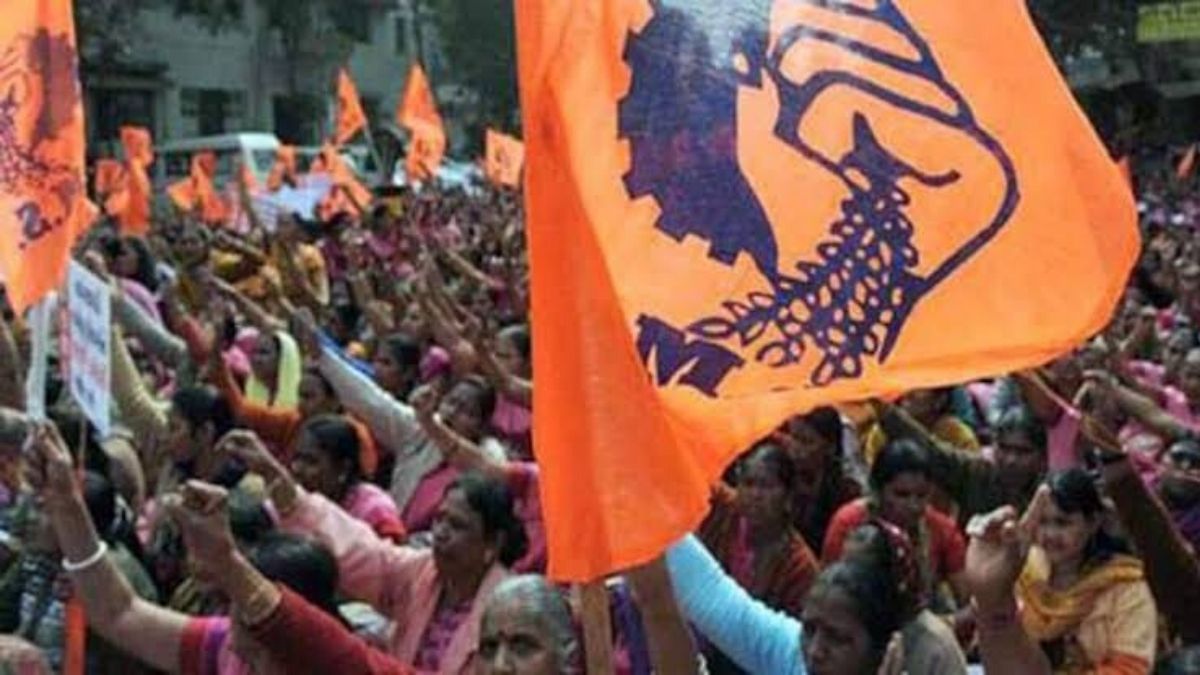


Dilution of labour laws in most states has RSS-affiliated Bharatiya Mazdoor Sangh (BMS) up in arms against most BJP-ruled states. BMS has requested chief ministers of different states to withdraw the suspension laid upon the labour laws of the country. The wing has decided to hold a meeting on Thursday and discuss its next move as it firmly believes that the changes in the laws can lead to yet another “jungle raj”.
“The nationwide lockdown due to Covid-19 has uprooted lakhs of labourers and deprived them of the basic necessities. It has resulted in losses of jobs and even livelihood, besides psychological and social issues. Various reforms and policies have been initiated by the Central and state governments to lessen the woes of the workers who constitute India’s 90% workforce.
But the extensive exemptions offered by Uttar Pradesh, Gujarat and Madhya Pradesh governments are a matter of concern as they hint at complete labour market anarchy,” said a senior BMS functionary. The exemptions drawn out by the governments revolve around three fundamental principles—no labour laws required in the society, therefore the state doesn’t play any role in the labour market; labour inflexibility is the main hassle to curb investment and economic enhancement’ and, workers should completely bank on the goodwill of the hirer.
The BMS is completely against these changes and is not ready to compromise on any grounds. In a press release, it mentioned, “Bharatiya Mazdoor Sangh had instructed the state units in different states to oppose the unilateral withdrawal of labour laws. They should write to the Chief Ministers of respective states to stop withdrawal of labour laws and ask the government to discuss with trade unions on every step taken in the labour sector.
The state governments have not so far been able to convince the public how labour laws are hurdles in economic activities and about the emergent situation requiring the extreme step of suspension of labour laws.” “These laws are against the humanitarian rights of the workers. They’re denied protection against unfair employers and they cannot move the court if need be. This is simple injustice,” said Virjesh Upadhyay, All India General Secretary of the BMS. Even if labour welfare is kept aside, the amendments will neither boost investment nor labour productivity. It will fuel significant industrial dissatisfaction and the absence of a structured settlement will only lead to disruption.
“The labour law changes proposed through the Ordinance of the UP government and subsequently by various other governments, destroys the fabric of Indian labour laws. Uttar Pradesh has sought to woo industries by junking all Labour Acts for three-year period barring, Bonded Labour Abolition Act, Employer Compensation Act, Building & Construction Workers Act and Section 5 of Payment of Wages Act. Similarly, Gujarat has waived off all Labour Acts for 1,200 days barring Minimum Wages Act, Industrial Safety Rules and Employee Compensation Act,” said Sanjeeva Shivesh, head of Economic Advisory, Sapio Umbrella.
“If Uttar Pradesh is keen to bring industries from China, there is only one way forward, focus on strengthening the manufacturing ecosystem and help make manufacturing business easier. That begins with easy approvals, providing good quality infrastructure, making compliances easy with non-human interface, and so on. China attracted industries by plug and play model, fully built factories where one just has to come and switch on the button. Tinkering with labour laws is not a good move in these times,” he added.
The suspension of labour laws in the three states is something to be more worried about as it may push other states to also do the same. These changes will lead to a levelling down of the globally accepted labour standards. Professor Jayati Ghosh, chairperson of the Centre for Economic Studies and Planning at JNU, said, “This is not only ethically vile but it is also economically stupid. The idea that you will extract more investment by producing an over exploited, underpaid, ill-fed, poorly housed and overworked workforce and that it will attract foreign investment is not only stupid but it has been proved wrong time and again.
We think we’re going to attract investments rather than China who have already attracted investors five times more than what we have over the last three decades and have paid their workers five times more. They have better conditions and much better legal protection. Now when foreign investors are moving out of China, they’re going to Vietnam and Thailand which also have much better labour protection and much higher wages.”
The apex industries have been pushing for the changes implied by the MP and UP governments. In all likelihood, the model set by UP will become the standard labour market regime in the future. K.R. Shyamsundar, a labour economist and professor at XLRI, said, “The Minimum Wages Act effectively covers as per 1999-2000 NSSO calculations 83.3% of the hired workers, the Payment of Wages Act, 1936, 22.9%, the Contract Labour Act, 15.1%. These mean huge exclusions though if we factor in the unorganised component, the coverage will be much higher and to that extent, the ‘uncoverage’ will be higher.”
“The manufacturing sector accounted for 27.91% of the total FDI inflows during April 2000 to December 2019. This raises a serious concern as to whether extending labour law holidays to the factory sector in these states will bring in FDI inflows as anticipated. Further, the shares of UP and MP in the total FDI inflows during October-December 2019 were 0.35% and 0.27% respectively. The economic justification thus is doubtful,” he added.